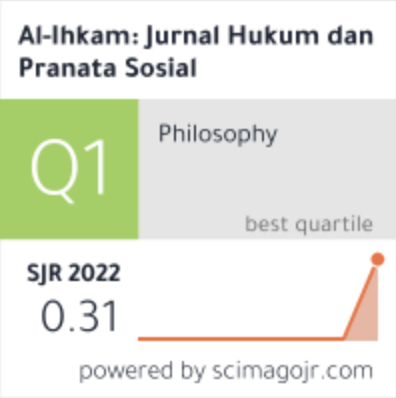PROBLEM PRAKTIK KHURÛJ BAGI ANGGOTA JAMA`AH TABLIGH DI MADURA
 Abstract views: 370
,
Abstract views: 370
,
 PDF downloads: 356
PDF downloads: 356
 Hasil review bebestari downloads: 0
Hasil review bebestari downloads: 0
Abstract
Khurûj is one of the teachings which is tightly attached to Jama`ah Tabligh that ordered all its followers to go out of the district/area to spread amr al-ma`rûf nahy al-munkar in a certain time. The main problem is when the khurûj obligation is faced to Family obligation. Those obligations can create problems when the member of the Jama`ah Tabligh cannot make the obligation to the family and the khurûj obligation balance. One of the examples is the divorce of the member of the Jama`ah Tabligh. The reason of the divorce is because the lack of living cost when the husband did the khurûj. To fulfill it, the wife gets debt from other people and she cannot pay it off. Doing the khurûj is an activity of Jama`ah Tabligh, where a member will be stated as a legal member when he has joined the khurûj. Khurûj concept in its application is devided into 3 phases. The First is 3 days in a month; the second is 40 days in a year, and the last is 4 months in a lifetime. But the theory of the counting is using unknown and unclear base either from Al-Qur’an and al-Sunnah or any other methods of dakwah that applied by Rasulullah. While Jama`ah Tabligh uses Saying from Al-Qur’an as theoretical foundation about khurûj, that is the word “ukhrijat” containing in QS. Ali Imran (3): 110
Downloads
References
Daftar Pustaka
Albani, Muhammad Nashiruddin Al-. Mukhtashar Shahih Muslim (Jakarta: Pustaka Azzam)
Mughniyah, Muhammad Jawad. Fiqih Lima Madzhab, Jakarta: Lentera, 2002
Sabiq, Sayyid. Fiqih Sunnah, Jakarta: Pena Ilmu dan Amal, 2006
Departemen Agama RI, Mushaf Aisyah Al-Qur'an dan Terjemah Untuk Wanita, Jakarta: Hilal, 2010
Hamka. Tafsir Al-Azhar, Jakarta: PT Pustaka Panjimas, 2005
Saebani, Beni Ahmad. Fiqih Munakahat 2, Bandung: CV Pustaka Setia, 2010
Muhyiddin, Asep. Kajian Dakwah Multiperspektif, Bandung: Rosda, 2014
Shihab, M. Quraish. Tafsir Al-Mishbah, Jakarta: Lentera Hati, 2005
Syarifuddin, Amir. Garis-Garis Besar Fiqih, Jakarta: Prenada Media, 2003
Tim Redaksi, Kompilasi Hukum Islam, Bandung: Nuansa Aulia, 2012
Yusuf, Muhammad As-Sayyid et. al, Ensiklopedi Metodologi Al-Quran 1, Mesir: Dar As-Salam Maktabah Al-Usrah, tth
Bungin, Burhan, Analisis Data Penelitian Kualitatif, Rajawali Press : Jakarta, 2010
Moleong, Lexy J., Metodologi Penelitian Kualitatif, (Bandung: PT Remaja Rosdakarya, 2005)
Suharsimi Arikunto. Prosedur Penelitian (Jakarta: PT Rineka Cipta, 2010)
Sugiono. Metode Penelitian Kuantitatif Kualitatif dan R&D, (Bandung: Alfabeta, 2011)
Internet
http://m.nu.or.id/a,public-m,dinamic-s,detail-ids,4-id,32537-lang,id-c,kolomt,Jama`ah+Tabligh-.phpx (diakses pada hari Jum’at tanggal 21 Maret 2014. 20.52 WIB)
http://m.nu.or.id/a,public-m,dinamic-s,detail-ids,4-id,32537-lang,id-c,kolomt,Jama`ah+Tabligh-.phpx (diakses pada hari Jum’at tanggal 21 Maret 2014. 20.52 WIB)
http://abusalma.wordpress.com/2007/01/03/studi-kritis-pemahaman-Jama`ahTabligh/(diakses pada hari Kamis tanggal 27 Maret 2014. 17.47 WIB)
In order to be accepted and published by Al-Ihkam: Jurnal Hukum dan Pranata Sosial, author(s) submitting the article manuscript should complete all the review stages. By submitting the manuscript, the author(s) agreed to the following terms:
- The copyright of received articles shall be assigned to Al-Ihkam: Jurnal Hukum dan Pranata Sosial as the publisher of the journal. The intended copyright includes the right to publish articles in various forms (including reprints). Al-Ihkam: Jurnal Hukum dan Pranata Sosial maintain the publishing rights to the published articles.
- Authors are permitted to disseminate published articles by sharing the link/DOI of the article at Al-Ihkam: Jurnal Hukum dan Pranata Sosial. Authors are allowed to use their articles for any legal purposes deemed necessary without written permission from Al-Ihkam: Jurnal Hukum dan Pranata Sosial with an acknowledgment of initial publication to this journal.
- Users/public use of this website will be licensed to CC-BY-SA.



.png)
_1.png)










